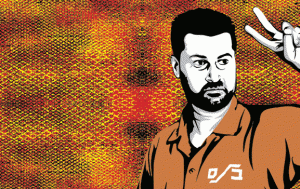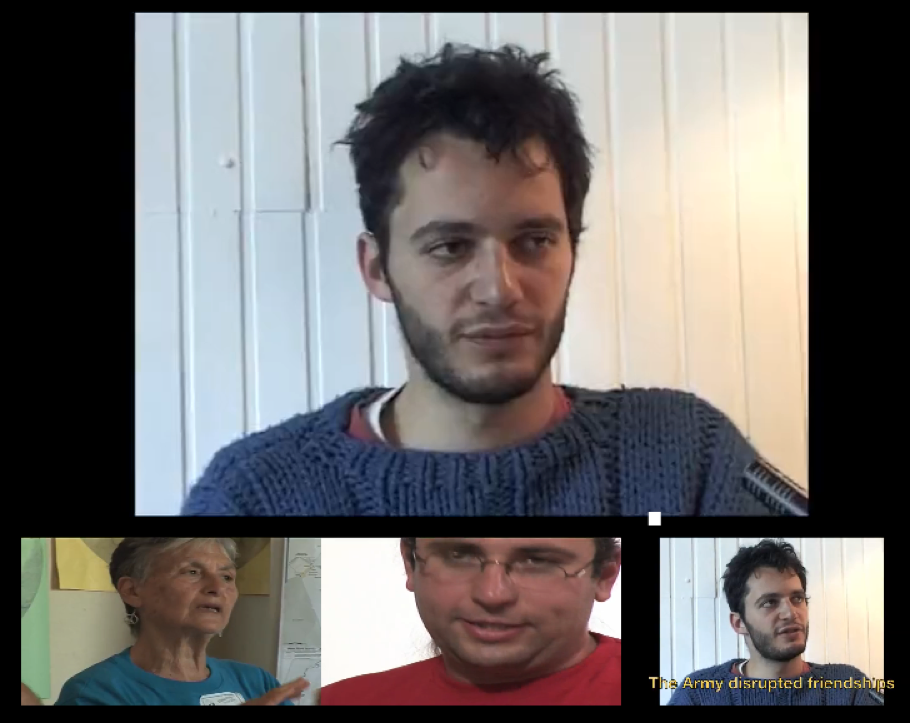The Only Democracy? » Human Rights Activists in the Crosshairs » What’s the point of a trial? Protest organizer detained indefinitely
What’s the point of a trial? Protest organizer detained indefinitely
From the Popular Struggle Coordination Committee:
Military Judge Orders to Keep Bil’in Organizer Jailed Even After He Has Finished Serving His Sentence in Full
Ed’s note: Not only is organizing popular protest apparently a crime, it is one deserving unending prison sentence. Since it is obvious Israel’s government has no intention of ending the theft of land that cause these protests in the first place, they must resort to locking up the organizer, or the messenger if you will. This should put to rest any thought that these policies of “administrative detention,” in the United States or Israel, are ok because they only target the “worst of the worst ticking bombs” etc.
Abdallah Abu Rahmah was scheduled to be released from prison last Thursday, after having served the one-year prison term he was sentenced to. He remains in jail after the Military Court of Appeals ordered today to keep him behind bars regardless, pending a decision in the Military Prosecution’s appeal of the sentence.
Judge Lt Colonel Aharon Mishnayot, the head of the Military Court of Appeals, accepted the military prosecution’s petition today to extend the detention of Abdallah Abu Rahmah past the term he was sentenced to, which ended last Thursday. The decision comes after a dramatic hearing last Thursday, on the Military Prosecution’s last minute petition to extend Abu Rahmah’s remand, which took place on the date of his scheduled release. The decision contradicts the jurisprudence of the Israeli Supreme Court on the issue, instructing that a prisoner should only be kept under arrest after his term was over in the most extraordinary of cases.
Gaby Lasky, Abu Rahmah’s layer said: “The decision to keep Abdallah Abu Rahmah detained even after his sentence has ended is a mockery of the very concept of justice, but comes as no surprise. The military prosecution and courts are a well oiled machine of politically motivated unfair legal process.”
Last month, on October 11th, Abu Rahmah was sentenced to twelve months imprisonment for his prominent role in his village’s successful campaign against the construction of Israel’s Separation Barrier on its lands. Abu Rahmah was convicted freedom of speech charges, incitement and organizing illegal demonstrations, but was cleared of all charges connecting him with violence.
Abu Rahmah was declared a human rights defender by the European Union, and his conviction and sentence generated international outrage, and was denounced by human rights organizations and the international community alike, including EU foreign policy chief, Catherine Ashton.
In the similar case of Adeeb Abu Rahmah – another Bil’in activist – the Military Court of Appeals has recently ordered the Bil’in organizer under remand despite the fact that he served his sentence in full. The Court of appeals eventually dramatically harshened the one-year sentence originally imposed on Adeeb Abu Rahmah by the first instance, increasing it by half to 18 months imprisonment.
Click here to see the judge’s decision (in Hebrew)
Background
Abu Rahmah, the coordinator of the Bil’in Popular Committee Against the Wall and Settlements, was arrested last year by soldiers who raided his home at the middle of the night and was subsequently indicted before an Israeli military court on unsubstantiated charges that included stone-throwing and arms possession. Abu Rahmah was cleared of both the stone-throwing and arms possession charges, butconvicted of organizing illegal demonstrations and incitement.
An exemplary case of mal-use of the Israeli military legal system in the West Bank for the purpose of silencing legitimate political dissent, Abu Rahmah’s conviction was subject to harsh international criticism. The EU foreign policy chief, Catherine Ashton,expressed her deep concern “that the possible imprisonment of Mr Abu Rahma is intended to prevent him and other Palestinians from exercising their legitimate right to protest[…]”, after EU diplomats attended all hearings in Abu Rahmah’s case. Ashton’s statement was followed by one from the Spanish Parliament.
Renowned South African human right activist, Archbishop Desmond Tutu, called on Israel to overturn Abu Rahmah’s conviction on behalf of the Elders, a group of international public figures noted as elder statesmen, peace activists, and human rights advocates, brought together by Nelson Mandela. Members of the Elders, including Tutu, have met with Abu Rahmah on their visit to Bil’in prior to his arrest.
International human rights organization Amnesty International condemned Abu Rahmah’s conviction as an assault on the right to freedom of expression. Human Rights Watch denounced the conviction, pronouncing the whole process “an unfair trial”.
Legal Background
Abu Rahmah, the coordinator of the Bil’in Popular Committee Against the Wall and Settlements, was acquitted of two out of the four charges brought against him in the indictment – stone-throwing and a ridiculous and vindictive arms possession charge. According to the indictment, Abu Rahmah collected used tear-gas projectiles and bullet casings shot at demonstrators, with the intention of exhibiting them to show the violence used against demonstrators. This absurd charge is a clear example of how eager the military prosecution is to use legal procedures as a tool to silence and smear unarmed dissent.
The court did, however, find Abu Rahmah guilty of two of the most draconian anti-free speech articles in military legislation: incitement, and organizing and participating in illegal demonstrations. It did so based only on testimonies of minors who were arrested in the middle of the night and denied their right to legal counsel, and despite acknowledging significant ills in their questioning.
The court was also undeterred by the fact that the prosecution failed to provide any concrete evidence implicating Abu Rahmah in any way, despite the fact that all demonstrations in Bil’in are systematically filmed by the army.
Under military law, incitement is defined as “The attempt, verbally or otherwise, to influence public opinion in the Area in a way that may disturb the public peace or public order” (section 7(a) of the Order Concerning Prohibition of Activities of Incitement and Hostile Propaganda (no.101), 1967), and carries a 10 years maximal sentence.
Filed under: Human Rights Activists in the Crosshairs · Tags: Abdallah Abu Rahmah, Administrative Detention, Bi'lin, Desmond Tutu, Protests Against the Wall, Trial









 “You have a choice! Israeli Anti-Militarists Speak”
“You have a choice! Israeli Anti-Militarists Speak”